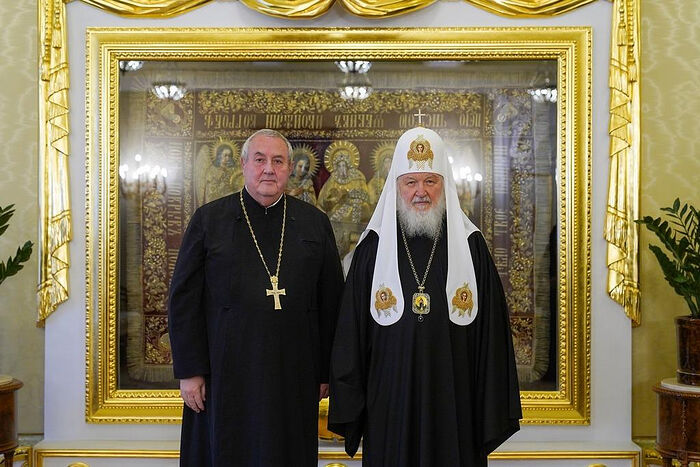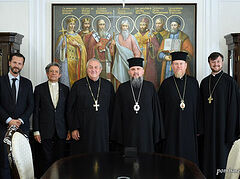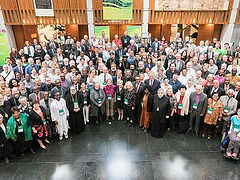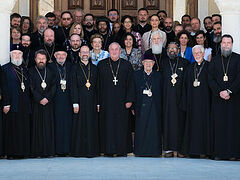Moscow, October 21, 2022
His Holiness Patriarch Kirill of Moscow met with the Acting General Secretary of the World Council of Churches, the Romanian Orthodox priest Fr. John Sauca, in Moscow on Monday to discuss the war in Ukraine and its effect on inter-Church relations.
Recalling his time as representative of the Moscow Patriarchate to the WCC in the 1970s, Pat. Kirill recalled: “In my memory, there were many political crises that put the inter–Christian movement in a very difficult position, and then there were challenges to the very fact of the existence of the WCC. But we have always found ways out of these situations and helped the churches to participate in peace–making processes.”
The Patriarch also expressed gratitude that the Russian Church wasn’t expelled from the WCC during its recent General Assembly in Germany. Certain members had demanded that the Russian Church be kicked out of the Council due to the Patriarch’s various statements about the war, “but nothing of the kind happened at the Assembly,” Pat. Kirill said, reports the Department for External Church Relations.
The Russian primate also reminded Fr. John that the conflict in Ukraine didn’t begin in February, but in fact, in 2014: “Eight years ago, the bombing of Donbass from Ukraine began. This is the reality: destroyed houses, a large number of victims. More than 2 million refugees from this region have found refuge in Russia.”
He recalled that he has personally appealed to political and religious leaders of the world, including the WCC, three times over the years to intervene in the situation, but his appeals were met with silence.
The Patriarch stressed that in this difficult situation, Donbass and other conflict zones require special attention:
First of all, it’s important that no more blood is shed, buildings and infrastructure are not destroyed, so that people’s suffering stops. Therefore, we are very interested in attracting the objective, unbiased attention of our ecumenical partners to this difficult and tragic situation, it’s important to convince world leaders to bring peace through negotiations and dialogue, and not through bloodshed and destruction.
His Holiness also spoke of the humanitarian efforts of the Church on all levels for Ukrainian refugees and those suffering from the war.
For his part, Fr. John Sauca noted that his visit was part of the mission established by the Central Committee of the WCC to visit member churches “with deep wounds,” including Syria, Lebanon, Israel and Palestine, Ukraine, and Russia.
“You are aware of the concerns expressed by the member churches of the World Council of Churches about the war between Ukraine and Russia. You are familiar with the positions that we voiced during the meetings of the Central Committee of the WCC,” Fr. John said. “We came here to understand what we can do together to build bridges of peace and reconciliation, how to stop the bloodshed and prevent the danger of nuclear conflagration.”
And referring to the Patriarch’s aforementioned appeals to world leaders, Fr. John called on him to make another appeal and clearly indicate his personal position:
I think it would very helpful now to make the same statement, saying clearly to the world what you told us, here, today: stop the bloodshed, stop the killing, stop the destruction of infrastructure, look for peace and reconciliation. This will help the whole world and the Orthodox Church and will make it clear what is your personal position to the war.
The Department for External Church Relations continues:
At the same time, according to Archpriest John Sauca, in the current situation it’s important to clarify the theological understanding of such a phenomenon as war. He suggested that it would be useful for inter-church relations today if His Holiness Patriarch Kirill offered his understanding of this topic, including what from a theological point of view can be considered a holy war, what grounds there can be for participation in hostilities, and what is the meaning of self-sacrifice of soldiers on the battlefield.
“The Patriarch stated that he does not think that any church or Christian can have a supporting position to wars and killings, and that churches ‘…are called to be peacemakers and to defend and protect life,’ he said. ‘War cannot be holy.’”
“But when one has to defend himself and his life or to give his life for the lives of the others, things look different, stated Patriarch Kirill. ‘We have so many examples in our Christian history,’ he said. ‘Yet, as peacemakers we have to make all efforts to bring peace through dialogue and avoid any conflict or violence.’”
In conclusion, Pat. Kirill called on the WCC to maintain a neutral stance in the conflict:
Therefore, today churches must not add fuel to the fire—we must do everything to put out the burning fires. In this sense, the World Council of Churches and the inter-Christian movement in general have a very important function. The active but neutral position of the World Council of Churches, which doesn’t support one or another political side in this conflict, is, in my opinion, the only correct one, and it should be maintained further.
Follow OrthoChristian on Twitter, Vkontakte, Telegram, WhatsApp, MeWe, and Gab!





